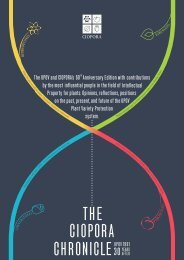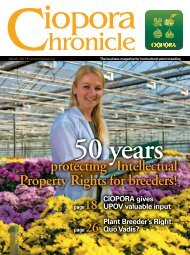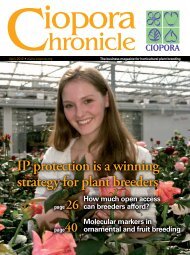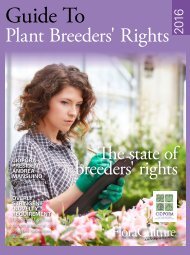2013 CIOPORA Chronicle
CIOPORA annual magazine on Intellectual Property protection for plant innovations 2013. Produced in cooperation with FloraCulture International. Read in the 2013 issue: - PBR topsy-turvy. How UPOV and its members turn the system upside down - Breeding industry ‘manifesto’ reflects strong visions and daily practice - Marketability of innovation – the power of ideas in horticulture - Contemporary marketing solutions for horticultural businesses - Hydrangeas in a PVR squeeze - Clearly or just about distinguishable? and more...
CIOPORA annual magazine on Intellectual Property protection for plant innovations 2013. Produced in cooperation with FloraCulture International.
Read in the 2013 issue:
- PBR topsy-turvy. How UPOV and its members turn the system upside down
- Breeding industry ‘manifesto’ reflects strong visions and daily practice
- Marketability of innovation – the power of ideas in horticulture
- Contemporary marketing solutions for horticultural businesses
- Hydrangeas in a PVR squeeze
- Clearly or just about distinguishable?
and more...
You also want an ePaper? Increase the reach of your titles
YUMPU automatically turns print PDFs into web optimized ePapers that Google loves.
France and UPOV<br />
By passing the<br />
law n° 2011-1843,<br />
France has finally<br />
acceded to the 1991<br />
Act of the UPOV<br />
Convention. Passed<br />
by the Parliament<br />
on November 28,<br />
2011, this law<br />
was published on<br />
December 8, 2011.<br />
On April 27, 2012,<br />
France ratified<br />
the 1991 Act with<br />
the deposit of its<br />
instrument to UPOV<br />
Office. The Act came<br />
into force in France<br />
on May 27, 2012.<br />
by Joël Guiard and<br />
Louise-Anne Petit<br />
France’s accession to the 1991<br />
Act of the UPOV convention<br />
France has been a member of<br />
the UPOV since October 1971<br />
and a part of the 1978 Act of<br />
the UPOV since February 1982. The<br />
accession to the 1991 Act has been<br />
discussed in depth, especially in<br />
regard to the farm-saved seeds issue.<br />
INOV<br />
The aim of the new law was to<br />
bring French legislation on Plant<br />
Breeders’ Rights in compliance<br />
with the 1991 Act of UPOV and<br />
also with the EU regulation (CE)<br />
2100/94, which is the legal base to<br />
get a Plant Breeder’s Right (PBR)<br />
applicable on the territory of the<br />
European Community.<br />
Article 1 of the law creates the new<br />
National Office for Plant Breeder’s<br />
Rights, called the Instance Nationale<br />
des Obtentions Végétales (INOV).<br />
INOV has its headquarters within<br />
the GEVES premises. GEVES is<br />
France’s official organisation<br />
overseeing the technical implementation<br />
of regulations on varieties<br />
and seeds.<br />
This new office replaces the former<br />
entity, which was a committee of<br />
experts called National Committee<br />
for Protection of Varieties. In the<br />
former organisation, the titles were<br />
delivered collectively by several<br />
experts. To simplify the procedure<br />
and reduce the delays, the head of<br />
INOV is now in charge of granting<br />
Plant Breeder’s Rights.<br />
The main missions of INOV are:<br />
• Granting Plant Breeders' Rights<br />
when varieties have fulfilled the<br />
legal requirements and delivering<br />
all official documents related to<br />
application and Plant Breeders’<br />
Rights.<br />
• Cancelling Plant Breeders’ Rights<br />
according to the conditions<br />
defined by law.<br />
Besides these, INOV is also in<br />
charge of proposing any measure<br />
required to implement the law<br />
on Plant Breeders’ Rights to the<br />
Ministry of Agriculture.<br />
Major modification<br />
Another major modification<br />
induced by the new law, is an<br />
evolution about the farm-saved<br />
seeds regulation (Article 16 of the<br />
law). The use of farm saved seeds<br />
was prohibited before the passing<br />
of the law. Now, the production of<br />
farm-saved seeds is authorised for<br />
the 21 species that are listed in the<br />
EU regulation (CE) 2100/94. The<br />
law stipulates that this list can be<br />
amended by decree of the Council<br />
of State (the highest administrative<br />
jurisdiction in France).<br />
Farm-saved seeds of a protected<br />
variety can be used without the<br />
authorisation of the owner of<br />
the Plant Breeder’s Right in two<br />
situations:<br />
• Freely by small farmers according<br />
to the definition given in the<br />
regulation (CE) 2100/94<br />
• By any other farmer subject to<br />
payment of a financial offset to<br />
the owner of the Plant Breeder’s<br />
Right.<br />
This system of levying financial<br />
offset aims to protect the interests<br />
of plant breeders and contributes<br />
to the financing of research for<br />
the creation of new varieties. For<br />
the purposes of the binding of the<br />
amount of this financial offset,<br />
either there is an interprofessional<br />
agreement or a contract between<br />
the owner of the right and the<br />
farmer. In the absence of such<br />
devices, the conditions for applying<br />
this derogation and the basis to<br />
define the amount are decided by a<br />
decree of the Council of State.<br />
Among the other modifications<br />
introduced by the new text, the<br />
following aspects can be highlighted:<br />
the introduction of the<br />
definition of the variety as written<br />
in the 1991 Act, the definition of<br />
the DUS system, the notion of the<br />
Essentially Derived Variety, the<br />
possibility to take into account<br />
technical examination results delivered<br />
by the applicant and the legal<br />
regime of Plant Breeders’ Rights<br />
infringement. The legal texts for the<br />
implementation of this new law are<br />
still under preparation. |||<br />
About the authors<br />
Louise-Anne Petit is an intellectual property lawyer. She has been<br />
working as legal manager at GEVES, the French official organisation<br />
in charge of the technical implementation of regulations on varieties<br />
and seeds, since 2012. Joël Guiard is an agronomist specialised in plant<br />
breeding working for GEVES, the French examination office for testing<br />
new plant varieties. He has been involved in the implementation of<br />
regulation on varieties and seeds for more than 30 years. He has acquired<br />
a wealth of experience in the field of Plant Breeder’s Rights, with active<br />
participation in the UPOV and the CPVO bodies.<br />
For further information: www.geves.fr<br />
48 www.FloraCultureInternational.com | <strong>CIOPORA</strong> <strong>Chronicle</strong> April <strong>2013</strong>









